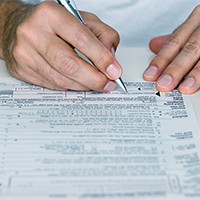What Expenses Can Commission Salespeople Claim?

Employees who earn their living negotiating contracts for their employers or selling on commission may claim certain itemized sales expenses. In all cases, however, receipt keeping is key; as is the availability of employer-signed Form T2200 Declaration of Conditions of Employment in case of audit.
A good place to start in gathering receipts is to download a copy of Form T777 Statement of Employment Expenses. There you will see that employees who are required to incur out of pocket expenses as a condition of their employment can write off expenses like accounting fees, which includes income tax preparation costs, and legal fees incurred to defend charges incurred in the normal course of business.
Also included in the deductible expenses are auto and travel costs, although these are subject to special rules. They are allowed only if salespeople are required to pay their own expenses, without reimbursement and without receiving a non-taxable allowance for the costs of travel. In addition, the employee must regularly perform their duties away from their employer’s place of business.
For commissioned salespeople, allowable expenses are categorized into two groups: deductible travel expenses (which can be claimed over and above commissions earned) and deductible sales expenses, which includes promotion, 50% of entertainment costs and home office costs in certain cases. However, this latter category is limited to the amount of commissions earned.
Or, explained another way, the expenses categories are separated because it is not possible to claim sales expenses that exceed commissions earned in the year, except for the costs of interest and capital cost allowances on an automobile.
It’s also important to understand that the definition an automobile, for capital cost allowance (CCA) purposes breaks down into two categories: passenger vehicles (Class 10.1), which may have restrictions on the amount of CCA, interest and leasing costs claimable and motor vehicles (Class 10), which do not.
Now, as employees await all their T-slip information, is a good time to get employers to verify in writing on form T2200 that expense reimbursement was not given and that the out-of-pocket payments were required as a condition of employment.
For those who wish to help friends, colleagues and neighbors with professional tax preparation services, it’s also still a very good time to take Knowledge Bureau’s certificate income tax courses, available in basic, advanced and proprietorship levels. The diploma achieved in taking these online courses – consider an investment of 90 hours of your time – will qualify you to seek employment or self-employment in the tax preparation industry.
Evelyn Jacks is President of Knowledge Bureau, a national educational institute for continuing professional development in the tax and financial services.
©2017 Knowledge Bureau Inc. All Rights Reserved. Used with Permission.
 |
 |
 |
 |
|
Refer a Friend |
Research |
Calculators |
Course Trials |
 |
 |
 |
 |